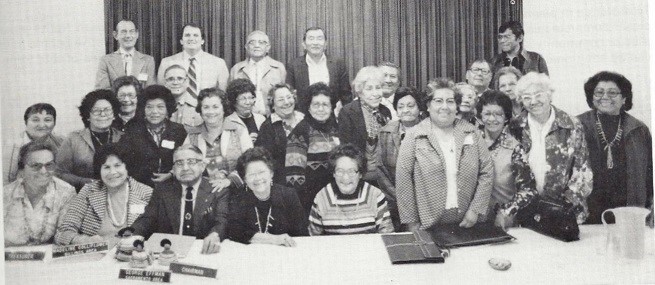
The first National Indian Conference on Aging was sponsored by the National Tribal Chairman’s Association (NTCA) in Phoenix, Arizona on June 15-17, 1976. Close to 1,500 American Indian and Alaska Native (AI/AN) people representing 171 tribes came together to speak of their needs and present recommendations for action to improve the quality of their lives. The meeting was coordinated by the National Tribal Chairman’s Association and led by President Wendell Chino.
Then: Creation of NICOA
In his address to the conference attendees Mr. Chino spoke at length about the history of contributions the American Indian/Alaska Native elders have given to this great country. He consistently reminded American Indian/Alaska Native and the US Congressional leaders that American Indians/Alaska Natives have a unique status as they are specifically mentioned in the US constitution. Robert J. Miller author of Native America, Discovered and Conquered: Thomas Jefferson, Lewis & Clark, and Manifest Destiny, explains the following:
American Indian tribes have played a major role in the development and history of the United States and have engaged in official, diplomatic governmental relations with other sovereign governments from the first moment Europeans stepped foot on this continent. Indian tribes have been a part of the day to day political life of the United States and continue to have an important role in American life today. Tribes continue to have a government to government relationship with the United States and they continue to be sovereign governments with primary control and jurisdiction over their citizens and their territories. It is no surprise, then, that the relationship between Indian people, tribal governments and the United States is addressed in the United States Constitution.
This important gathering led to the creation of the National Indian Council on Aging (NICOA). NICOA carries on the mission to advocate for improved comprehensive health, social services and economic well-being for American Indian and Alaska Native Elders. NICOA is a membership organization governed by a 13-member board of directors composed of American Indian and Alaska Native (AI/AN) Elders representing each of the 12 Bureau of Indian Affairs regions, and a representative of the National Association of Title VI Grantees.
Prior to the 1976 National Indian Conference on Aging, recommendations were formulated by the Session on the Elderly Indian at the 1971 White House Conference on Aging (WHCoA). The recommendations were endorsed and reconfirmed by the participants in the 1976 National Indian Conference on Aging. These recommendations were:
1) Not terminate Indian tribes (which means abrogating treaties with the result that Indian tribes would no longer be federally recognized),
2) Establish an Indian desk within the Administration on Aging,
3) Amend the provision within the Older Americans Act to permit funding from the federal government to flow directly to Indian Tribes (and Alaska Natives). These tribes would no longer have to go through state agencies for funding,
4) Increase AoA funding to adequate amounts in order to serve American Indians and Alaska Natives,
5) Create grants that fund research programs that look at existing laws and policies that serve the elderly Indian population.
Now: The Affordable Care Act (ACA)
Now over 35 years later we ask ourselves have these issues been addressed? Of the issues presented above, numbers 1, 2, and 3 have been attained but 4 and 5 remain persistent, unresolved issues. But hopeful improvements are on the horizon. The Affordable Care Act has permanently reauthorized the Indian Health Care Improvement Act. This will allow the Indian Health Service (IHS) to make important improvements in their provision of care. The Indian Health Service is chronically underfunded but now American Indian/Alaska Natives will have more choices about the care they receive.
Many American Indian Alaska Native Elders receive Medicare benefits and will not need to take part in the Health Insurance Exchange process, they are already covered.
Enrollment in the Health Insurance Exchanges begins on October 1st but there are no deadlines for AI/ANs, they can enroll at any time. They can visit any IHS hospital, Tribal Clinic or Urban Indian Health Clinic.
Currently the Department of Health and Human Services is struggling with the definition of American Indian/Alaska Native. They are aware of a problem with the inconsistent definition of the word “Indian” in the Affordable Care Act. A uniform definition of “Indian” shall allow AI/ANs access to federally supported health care, including the ACA exchanges, Medicaid and IHS services. It also prevents unjust tax penalties from which AI/ANs should be exempt.
Policy makers, Tribal leaders and stakeholders are working to understand the implications of the act on American Indian people. To learn more, check out these resources: Centers for Medicare and Medicaid Services, Indian Health Service, and the National Indian Health Board. Our status as American Indians/Alaska Natives is unique. But we have to come together and find fair, equitable solutions as providers of services and offer advice to our Elders directly and through our partnerships with the Diverse Elders Coalition, the Aging Services Network and interested stakeholders.
One thing we learned from our Indian Elders is that they accept the process of aging. Mr. Chino observed, “Indian people have never been ashamed of growing old. They merely accept it as a fact of life because they understand the forces of life and the forces of nature that all and everything that lives, also decays.”
There’s so much to digest here but I just want to say that engaged input from interested policy makers and advocates is vital for our momentum on this movement to educate our American Indian/Alaska Native Elders. Thanks to those who have been laboring on these issues for all you have done thus far. You are respected and valued for your efforts. This is an exciting and important task as we work for the future good health of all American Elders everywhere! If you are or know an American Indian/ Alaska Native Elder, encourage them to join NICOA to help continue educating policy makers about diversity in aging.
Leave a Reply